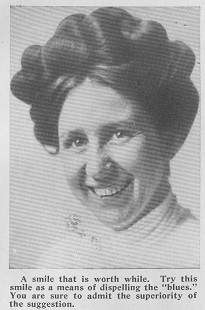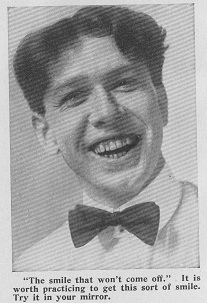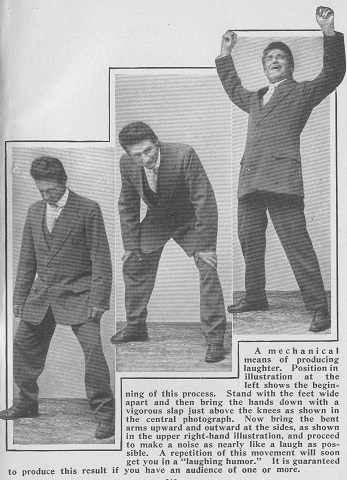
 The physiological effects of the mechanical and mental processes involved in laughing are not generally understood and appreciated. The "laugh cure" is a reality, for it is a remedy of very great value. Many a man, placed in a trying situation, would have been saved from tragical consequences if he could have found some means of arousing the emotions expressed in a good hearty laugh.
The physiological effects of the mechanical and mental processes involved in laughing are not generally understood and appreciated. The "laugh cure" is a reality, for it is a remedy of very great value. Many a man, placed in a trying situation, would have been saved from tragical consequences if he could have found some means of arousing the emotions expressed in a good hearty laugh.
Naturally there may be times in life when a laugh is utterly impossible, or may seem so. Nevertheless the inclination to stimulate the emotions associated with laughter and good humor should be encouraged at every opportunity. There is no question that laughter has valuable vitalizing qualities. It undoubtedly adds to one's stamina. It gives one a hopeful spirit. It leads one to look upon the bright side of life. When you can laugh, the sun is shining regardless of how many clouds obscure the sky. No matter what other efforts you may be making to build strength and vitality, do not allow the serious aide of life to occupy you continuously.
Each day should have its laughing time, or its many laughing times.
It is barely possible, of course, that laughing, like any other emotional expression, would become tiresome if overdone, but I am inclined to doubt the possibility of harmful effect under any circumstances. "All work and no play makes Jack a dull boy," and the relaxation and recuperation that go with laughing should be sought with a certain amount of regularity. If you cannot find recreation of this kind through any other source, then attend a "funny show." Go to a theatre where merriment is supreme. On such occasions at least I would avoid tragedies or dramas that are inclined too much toward the sorrowful side of life. Personally, I have never had much use for plays of this sort. There are slough serious experiences in life without searching for recreation in the sorrows of others, which are, after all, only the expression of the imagination of some brooding dramatist. Some abnormal characters find pleasure in misery. I have heard some women say that "they enjoyed a good cry so much," and that "crying dramas were just grand." But I have been unable to discover anything rational in such sentiments.
I may say, however, that in a sense there is a certain basis for this sentiment under certain circumstances. For crying, like laughter, has the physiological effect of producing a relaxation of tense nerves.
Healthy? Happy? Relaxed? Matt Clarkson has created a no cost mini course teaching simple meditation exercises for busy people. Each part gives you an exercise, inspirational message or tip to help you calm the mind and reduce stress. If your health is important to you, click here
 There is a fundamental basis for crying, but this applies only to exceptional instances in which there is too much nervous tension. When nerves are strained to the "breaking point," crying will bring about a state of relaxation, and one will feel better. If there are times of strain when laughter is utterly impossible, then crying might even be beneficial. The effect on the breathing is very much the same in both cases, and there is a curious similarity in the action of the diaphragm and the mechanical character of the expulsion of the breath. Looking at a person from behind, one cannot tell whether he is laughing or crying. Both produce relaxation of the nerves, both increase the activity of the lungs, and both involve a form of gymnastics for the diaphragm and entire breathing apparatus.
There is a fundamental basis for crying, but this applies only to exceptional instances in which there is too much nervous tension. When nerves are strained to the "breaking point," crying will bring about a state of relaxation, and one will feel better. If there are times of strain when laughter is utterly impossible, then crying might even be beneficial. The effect on the breathing is very much the same in both cases, and there is a curious similarity in the action of the diaphragm and the mechanical character of the expulsion of the breath. Looking at a person from behind, one cannot tell whether he is laughing or crying. Both produce relaxation of the nerves, both increase the activity of the lungs, and both involve a form of gymnastics for the diaphragm and entire breathing apparatus.
 But, while crying can certainly sometimes offer relief from extreme tension or grief, this argument does not justify crying for the so-called pleasure derived from it.
But, while crying can certainly sometimes offer relief from extreme tension or grief, this argument does not justify crying for the so-called pleasure derived from it.
Laughter is a pleasure, in itself, as well as a symptom of merriment. It is the expression of keen, bounding joy. It is an emotive manifestation that stirs one's whole nature and vitalizes every part of the body. There is a sound, physiological basis for amusements that make us laugh. Taking the world over, incalculable sums of money are spent for amusements that make us laugh, and it is money well spent. It is a sound and healthy instinct that leads the tired business man or the tired laborer to seek for mirth-provoking recreations. Professional "funny men" like John Bunny and Charles Chaplin undoubtedly add to the health of the human race, and they add to the vitality of those in whom they stimulate laughter. I feel sorry for anyone who has lost the power to laugh freely and heartily. When a man has brooded so much over the sorrows and miseries of life that he can no longer laugh, his condition is indeed serious.
"Laugh and the world laughs with you; weep and you weep alone," is one of the truest things that Ella Wheeler Wilcox ever said. For a laugh that is spontaneous and heartfelt is truly contagious, and in your little world, the circle of your friends, laughing brings a rich reward in increasing your own happiness as well as theirs.
The bodily expression and mechanical efforts that go with happiness will often induce the feelings and emotions associated therewith. To prove the accuracy of this statement, some morning when you are feeling especially gloomy and unpleasant, look into your mirror and go through the process of trying to make yourself smile. Screw up your features in such a manner as to force the required contractions of the facial muscles. If you continue your efforts long enough you will surely be rewarded by a real smile, and with the sense of good cheer that a smile will bring. You will make the surprising discovery at it is no longer an effort, for you will smile spontaneously.
To go even further try the laugh cure in the following manner. First of all assume a laughing position, in order to laugh properly and to secure the best results. Stand with feet far apart, and with the knees slightly bent. Now bring the palms of both hands down and "slap" them vigorously on the legs just above the knees, and then swing your bent arms overhead, making a noise as nearly as possible like laughing. Yes, you are quite right, it will sound very much like a cold stage laugh at first, and you will have to force it, but as you go on with the experiment it will gradually become more natural. Continue this long enough and I defy anyone to differentiate the emotions aroused from those associated with a real, spontaneous laugh.

, if you have company while you are going through this process, I will guarantee that they will soon be "guffawing" loudly and violently. This experiment is an excellent one to thy on a company that is especially dull and in need of something unusual to awaken the spirit of good cheer.
Vitality Supreme - Table of Contents
Page Updated April 11, 2025
Web Page Copyright 2025 by Donovan Baldwin
